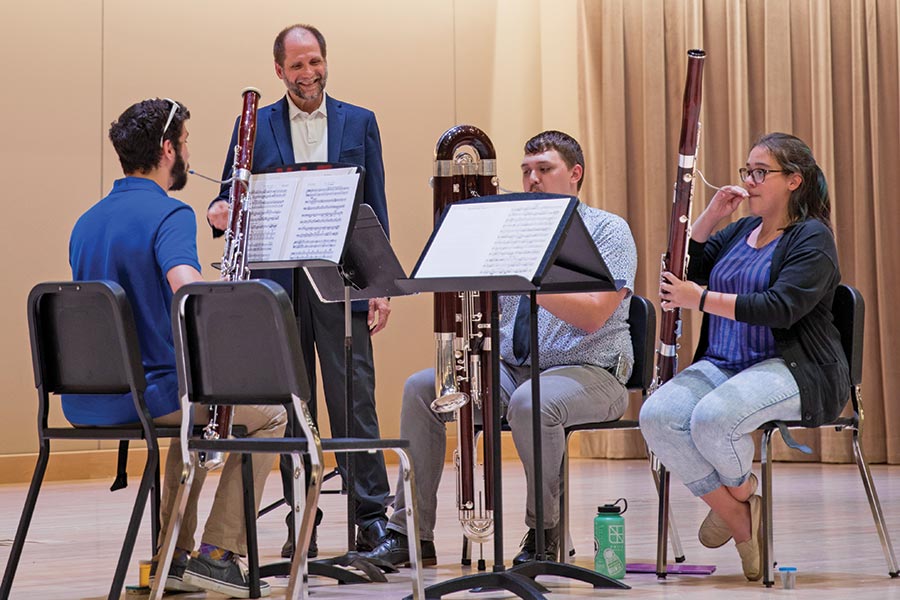ACADEMICS
An Academic Crescendo
Nazareth’s new School of Music presents opportunities for growth.
by Joanie Eppinga and Eamonn Neff

Nazareth has long had an excellent and robust music program — that's nothing new. With a variety of music-related degrees, a world-class, respected, and committed faculty, and ensembles that are open to music students and non-music students alike, it's no surprise that the college had more than 250 students across the six undergraduate and three graduate music programs last year.
What is new is that the Music Department is now the School of Music.
"We're most appreciative that the administration is providing the way for us to reach our potential as an academic and professional music institution," says Mario Martinez, who is the director of the new school. "We can now offer a much broader educational experience."
What distinguishes Nazareth's new School of Music? Martinez says that schools of music have traditionally been thought of as conservatories, where students focus largely on one subject. But programs like Nazareth's offer outstanding professional musical training coupled with a vibrant liberal arts core. That means "we are able to create new paths for learning — ones useful for entrepreneurs, performing musicians, composers, therapists, educators, scholars, and businesspeople in music-related professions," Martinez says. The School of Music is aided in these endeavors by a highly regarded staff, including an associate director, eight program directors, and four area coordinators, who have long dreamed of having the department become a school.
And now the dream has come true. "This advancement means the scope has opened up for us," says Martinez, an accomplished opera singer and a seasoned arts administrator. "We can grow existing programs, offer new programs, and achieve greater recognition on regional, national, and international levels. It means we can compete at a higher level. That will, in turn, keep the quality of students we get high and contribute to the expansion of our programs."
New instructional programming is a chief benefit of establishing the School of Music, Martinez says. "We're very strong in performance, music education, music therapy, composition, music business, and music theory and history," he observes. "We want to continue to grow in all these areas." The new designation also offers growth opportunities in philanthropy. Donors are able to invest in students through endowments and scholarships, or may make specific named gifts.
Another new element in Nazareth's music world — the Glazer Music Performance Center — played a role in the department becoming a school. "No music program can reach its potential without a fully equipped library and adequate venues for its programs to develop," Martinez says. "The Center provides high-caliber engagement with the community, regionally and nationally." Last year, thanks to programming by the music department and the Arts Center, Glazer welcomed thousands of people to experience the new facility. "They were ecstatic when talking about the acoustics and what this place can offer," Martinez says.
Martinez sounds equally pleased when he says that this shift in identity "will finalize Nazareth's positioning in the market as a top regional and national school of music." It's a change that simultaneously recognizes the high-caliber quality of current programming and creates opportunity for the future.
Joanie Eppinga is a writer and editor in Madison, Wisc. Eamonn Neff is a freelance writer and writing coach in Spokane, Wash. Photo by Hannah Betts.